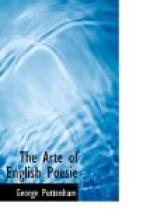of our fruite trenchers of wood, or vse them as deuises
in rings and armes and about such courtly purposes.
So haue we remembred and set forth to your Maiestie
very briefly, all the commended fourmes of the auncient
Poesie, which we in our vulgare makings do imitate
and vse vnder these common names: enterlude, song,
ballade, carroll and ditty: borrowing them also
from the French al sauing this word (song) which is
our naturall Saxon English word. The rest, such
as time and vsurpation by custome haue allowed vs
out of the primitiue Greeke & Latine, as Comedie,
Tragedie, Ode, Epitaphe, Elegie, Epigramme, and other
moe. And we haue purposely omitted all nice or
scholasticall curiosities not meete for your Maiesties
contemplation in this our vulgare arte, and what we
haue written of the auncient formes of Poemes, we haue
taken from the best clerks writing in the same arte.
The part that next followeth to wit of proportion,
because the Greeks nor Latines neuer had it in vse,
nor made any obseruation, no more then we doe of their
feete, we may truly affirme, to haue bene the first
deuisers thereof our selues, as [Greek: autodidaktoi],
and not to haue borrowed it of any other by learning
or imitation, and thereby trusting to be holden the
more excusable if any thing in this our labours happen
either to mislike, or to come short of th’authors
purpose, because commonly the first attempt in any
arte or engine artificiall is amendable, & in time
by often experiences reformed. And so no doubt
may this deuise of ours be, by others that shall take
the penne in hand after vs.
CHAP. XXXI.
Who in any age haue bene the most commended writers
in our English Poesie, and the Authors censure giuen
upon them.
It appeareth by sundry records of bookes both printed
& written, that many of our countreymen haue painfully
trauelled in this part: of whose works some appeare
to be but bare translations, other some matters of
their owne inuention and very commendable, whereof
some recitall shall be made in this place, to th’intent
chiefly that their names should not be defrauded of
such honour as seemeth due to them for hauing by their
thankefull studies so much beautified our English
tong (as at this day) it will be found our nation
is in nothing inferiour to the French or Italian for
copie of language, subtiltie of deuice, good method
and proportion in any forme of poeme, but that they
may compare with the most, and perchance passe a great
many of them. And I will not reach aboue the time
of king Edward the third, and Richard
the second for any that wrote in English meeter:
because before their times by reason of the late Normane
conquest, which had brought into this Realme much
alteration both of our langage and lawes, and there
withall a certain martiall barbarousnes, whereby the
study of all good learning was so much decayd, as long
time after no man or very few entended to write in
any laudable science: so as beyond that time




